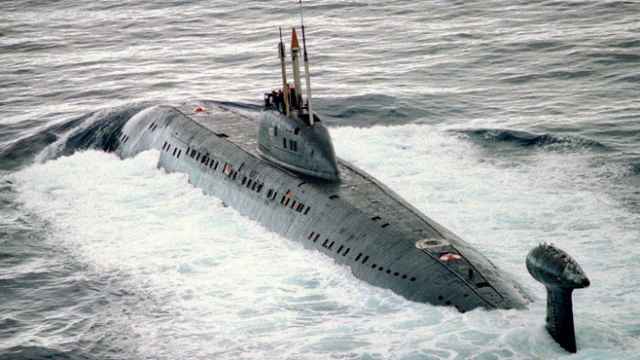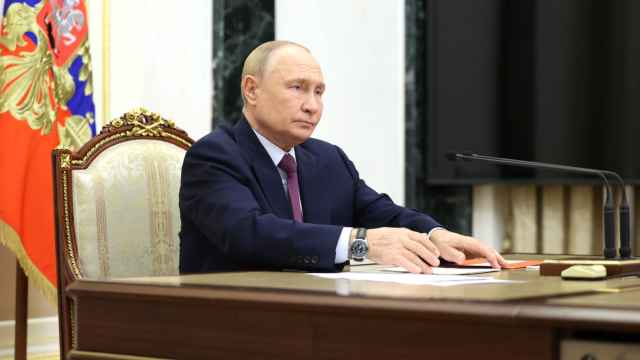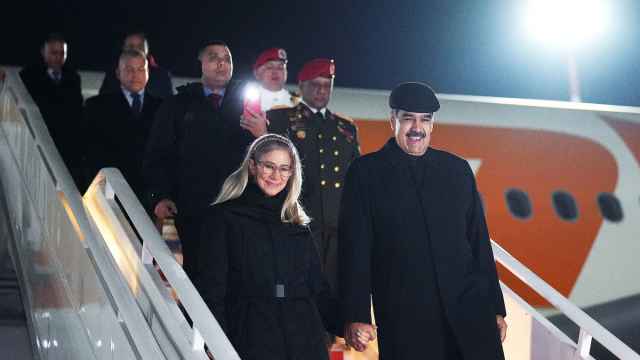Sweden released on Sunday a grainy photo of a mysterious vessel in Stockholm's archipelago, as the military hunted for a foreign submarine or divers in the country's biggest such mobilization since the Cold War.
The search in the Baltic Sea less than 30 miles (50 kilometers) from Stockholm began on Friday and reawakened memories of the final years of the Cold War when Sweden repeatedly sought out suspected Soviet submarines along its coast with depth charges.
The military showed one picture of what appeared to be a craft surrounded by white ripples. The witness who took the photograph said the vessel then submerged — one of three sightings that the military said were credible reports.
The Swedish armed forces have consistently labelled the their hunt one of investigating "foreign underwater activity" but elaborated on what that might entail on Sunday.
"It could be a submarine, or a smaller submarine," Rear Admiral Anders Grenstad told a news conference. "It could be divers using some form of moped-like underwater vehicle and it could be divers that don't have any business on our territory."
Grenstad said the sightings had taken place in "an area that is of interest to a foreign power," but added he was not in a position to link the observed activity to any particular nation.
"This does not belong to us. It is a foreign vessel and we have no indications that there would be any civilians involved in underwater activity," he said.
The incident comes amid rising tension with Russia among the Nordic and Baltic states — most of them European Union members — over Moscow's involvement in the Ukraine crisis. Finland last week accused the Russian navy of interfering with a Finnish environmental research vessel in international waters.
Reported sightings of one man dressed in black wading through waters led to speculation of Russian special forces in the archipelago, normally a popular holiday destination consisting of thousands of small islands.
Emergency Frequency
The Swedish military has said the initial information about suspicious underwater activity came from a trustworthy source, without providing details, and that more than 200 military personnel were involved in the search.
The Swedish daily Svenska Dagbladet, citing unidentified sources with knowledge of the hunt, said it began after a radio transmission in Russian on an emergency frequency.
Further encrypted radio traffic from a point in the archipelago and the enclave of Kaliningrad, home to the Russian Baltic fleet's headquarters, was intercepted on Friday evening after the Swedish search started, the newspaper said.
Grenstad said the armed forces had not received any information about a distress signal.
The Russian Defense Ministry said Sunday there were no emergencies in the Baltic involving its vessels.
"Russian Navy ships and submarines are fulfilling their duties in the world ocean waters in accordance with the plan," Interfax news agency quoted a ministry spokesman as saying. "There are no extraordinary, let alone emergency, situations involving Russian warships."
Countries in the Baltic Sea region have become increasingly wary of Russia's military ambitions since Moscow annexed Ukraine's Crimea region in March following the overthrow of Kiev's pro-Moscow president by protesters.
Last month, Sweden said two Russian warplanes entered its air space, calling the intrusion a "serious violation."
Should the present search find proof of foreign military activity in Swedish coastal waters it will represent the first real test of Prime Minister Stefan Lofven's center-left minority government less than three weeks after it took office.
In 1981, a Soviet submarine known under its Swedish designation U137 was stranded deep inside Swedish waters not far from a major naval base in the neutral country, sparking intense suspicion about the scale and motives of such incursions.
A Message from The Moscow Times:
Dear readers,
We are facing unprecedented challenges. Russia's Prosecutor General's Office has designated The Moscow Times as an "undesirable" organization, criminalizing our work and putting our staff at risk of prosecution. This follows our earlier unjust labeling as a "foreign agent."
These actions are direct attempts to silence independent journalism in Russia. The authorities claim our work "discredits the decisions of the Russian leadership." We see things differently: we strive to provide accurate, unbiased reporting on Russia.
We, the journalists of The Moscow Times, refuse to be silenced. But to continue our work, we need your help.
Your support, no matter how small, makes a world of difference. If you can, please support us monthly starting from just $2. It's quick to set up, and every contribution makes a significant impact.
By supporting The Moscow Times, you're defending open, independent journalism in the face of repression. Thank you for standing with us.
Remind me later.






